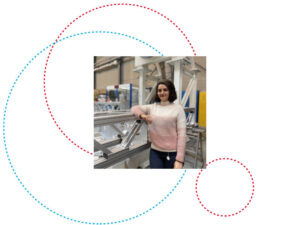Inspiring younger generations to follow their dreams can be extremely powerful. Choosing a college education and a career path can be confusing times for young adults. That’s when people’s stories, their experiences and advice might come in handy.
Farzaneh Gholami graduated from the Interdisciplinary Space Master (ISM) in 2021 and now works as a Space & Sustainability Engineer. Today, she shares the experience of building her career with us.
Farzaneh, why did you choose the ISM programme?
With a background in Chemical Engineering and a Master’s in Renewable Energy Engineering, enrolling in ISM was an opportunity for me to expand my knowledge and update my skills. After reviewing the ISM syllabus, I knew that this program was what I was looking for. Engaging in space activities was the very dream of my childhood. I’ve always been very interested in the adventures humans can have out of this world.
What do you do now professionally?
As a Space & Sustainability Engineer at GRADEL, I have the opportunity to integrate my two areas of expertise: my Master’s in Space and my background in Renewable Energy Engineering. In essence, I am looking for innovative technologies that promote sustainability within the space industry. For example, at GRADEL, we are developing lightweight technology which is based on extremely optimised design and using eco-friendly materials. With this we can achieve up to 70% weight saving. If we employ this technology, we can reduce the fuel consumption of launchers and payload for planetary missions.
How did your studies prepare you for your job?
Well, in a way the ISM opened the door to my current job. For my fourth semester, I decided to gain real-world experience by interning with an industry partner and GRADEL offered me this opportunity. I went above and beyond my original master’s thesis and I dedicated myself to helping them make their future projects less risky, and in return, I was invited to join the company. The project management course of the ISM has been very helpful in my daily work, I gained a lot of practical know-how that I apply every day. In addition, the business course was very practical as it helped me to analyse the process of developing a new lightweight product at GRADEL. I also learned to finetune crucial self-management skills thanks to the dense schedule of the ISM programme!
What makes the ISM a unique experience?
So many things! To begin, Luxembourg is multicultural and multilingual, and this diversity can also be seen in the ISM. The courses are multidisciplinary and both students and professors are of different backgrounds – even more diversity here! What’s also great is that students get the opportunity to meet different companies in a range of sectors. I also really valued the networking aspect of the ISM: there were many conferences, events, and space cafés where we could also meet political and economic stakeholders.
What was your most exciting ISM experience?
There were a few of those! The first time we went to the LunaLab was definitely exciting: we programmed rovers and used image processing techniques to analyse the environment of the lab – spoiler: it looked exactly like the moon, with sand, craters, and everything! I also found the business course very inspiring because I learned to formulate business cases and present them to other students. I also got the chance to participate in hackathons and found it exciting to create a solution for a problem in the space sector within a quite short time span.
Farzaneh works as a Space & Sustainability Engineer at Gholami since 2022. Prior to that, she received her master’s degree in 2021 after completing the Interdisciplinary Space Master (ISM) at the University of Luxembourg. From 2016 to 2018, she was graduate research assistant at the University of Tehran, Iran. In 2016, she obtained a Master of Science in renewable energies engineering at the Materials and Energy Research Center (MERC), Iran. She holds a bachelor’s degree in chemical engineering from Guilan University, Iran.GRADEL
About the ISM
The ISM is a unique study programme of the University of Luxembourg, which was developed in partnership with the Luxembourg Space Agency (LSA). The programme is characterised by a project-based learning approach. Students are educated in an interdisciplinary way with strong links to national stakeholders, also from industry. The ISM includes studies in space systems engineering, space informatics, entrepreneurship, and business management.
